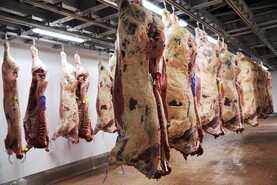Numbers remain tight but there has been little move on price. Last week’s kill was the first time in 2014 that saw numbers fall lower than the same week in 2013. It was also just the fifth time all year that we dipped below the 30,000 figure.
There are increased reports of factory agents being active around the sales ring.
Some agents have been given the green light to go harder for suitable stock.
Ultimately, this stock doesn’t always reflect the specifications communicated to farmers last year and in the first six months of this year.
Buyers associated with northern factories are also active for store cattle, with a focus on Friesian-type stock. This seems to fly in the face of current labelling issues.
This demand reflects the tight supply of cattle in the North, with the increased value of sterling against the euro also having an effect. A value of 0.78p sterling to the euro compared with 0.81p in early June is a difference of €31 on a €1,000 animal.
Steers and heifers: The top of the trade for in-spec heifers that tick all the boxes are commanding €3.85/kg.
Some farmers have been receiving this price for groups of steers and heifers.
Factories are still trying to downplay quotes and the demand for stock.
Numerous factories are quoting a base of €3.70/kg for steers and heifers, with some moving up to €3.73/kg and slowly to €3.75/kg.
There are processors reluctant to pass €3.75/kg. These prices exclude the 12c/kg QPS bonus and are for quality assured (QA) cattle under 30 months of age.
It is also getting a lot easier to move Friesian cattle, with some buyers willing to put them on the grid. In general, over 30-month Friesian steers are trading at €3.60/kg to €3.65/kg, with over 30-month continental steers now getting up to €3.75/kg.
Bulls: The bulk of the reduction in this week’s kill has come from a reduced number of bulls being slaughtered.
Down from over 4,200 a month ago down to 2,600 last week, the supply of bulls has begun to tighten.
Agents are now willing to pay up to €3.70/kg and €3.80/kg for over 16-month R and U grade bulls. With supplies tight in many cases, there are no penalties incurred up to 440kg.
Buyers don’t seem as interested in young bulls, with the tops of the market said to be making €3.70/kg up to €3.80/kg. These prices exclude the 12c/kg QPS bonus.
Speaking with a number of larger finishers at this time of the year, they would normally have sheds full of cattle, but this is not the case this year.
Cows: Demand for cows remains solid as factories continue to freely give €3.20/kg and up to €3.30/kg in some cases for O grade cows.
They are paying up to €3.10/kg for P grade cows. R grade cows are trading from €3.25/kg to €3.40/kg. U grade cows, which are said to be less plentiful, are making up to €3.60/kg.
Northern Ireland: Base quotes are at €4.00/kg (316p/kg) unchanged for both steers and heifers, compared with last week’s.
Regular suppliers with larger volumes are securing better deals. With numbers tight, farmers are applying pressure to get factory offers to a base of €4.05/kg (320p/kg).
Last week’s Northern Ireland kill was the lowest kill on record for over 10 years, back to 4,442.
Britain: The week ending 19 July was the fifth week in a row that price for prime average cattle remained steady, up 1p to around 326p/kg.
It was reported that the market was more balanced than recent times, steadied by demand for beef in the fine weather and tighter supply.
It should be noted that over the same period, the differential between a 360kg R4 steer in Ireland and Britain has risen from €207 to €260.






 This is a subscriber-only article
This is a subscriber-only article










SHARING OPTIONS: